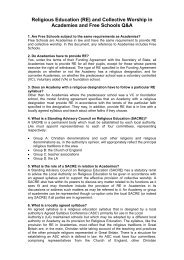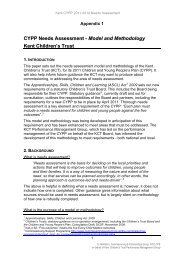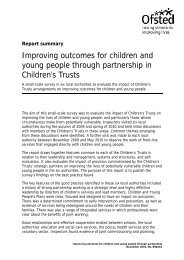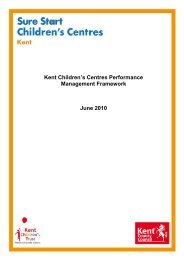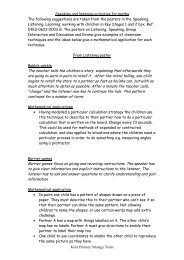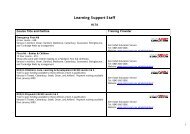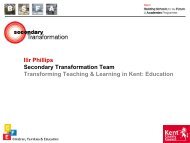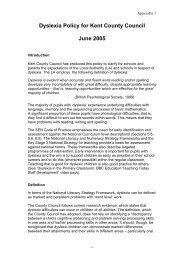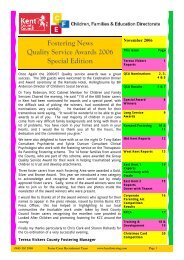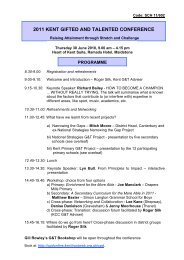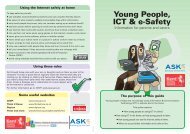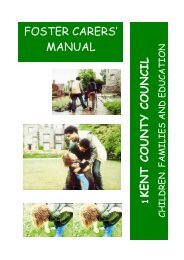Key Stage 1 - Kent Trust Web
Key Stage 1 - Kent Trust Web
Key Stage 1 - Kent Trust Web
Create successful ePaper yourself
Turn your PDF publications into a flip-book with our unique Google optimized e-Paper software.
The Role of the Moderation Team<br />
The Moderation Team for 2013 will consist of current <strong>Key</strong> <strong>Stage</strong> 2 practitioners, experienced <strong>Key</strong> <strong>Stage</strong> 2<br />
moderators, primary school Headteachers and Leading Assessment for Learning Teachers. The LA may<br />
be monitored in its duties by STA personnel.<br />
To ensure that fair and consistent assessments are made, members of the team will moderate the<br />
assessment of the lowest achieving Level 5 in Years 6 and 7 from each school – if there are no Level<br />
5s, then the highest achieving Level 4.<br />
All pieces submitted to the team will be looked at by at least two moderators to ensure a consistency of<br />
moderation within the team.<br />
The team will keep a log of all pieces of work submitted to it. The outcome is recorded as a means of<br />
quality assurance.<br />
The team may request extra samples from schools where their judgement differs. Further samples may be<br />
requested from any school where concerns are raised on the consistency of the levels awarded.<br />
The Moderation Manager (Margo Barraclough) will ensure that the Headteacher of the primary or junior<br />
school is formally notified where there are changes made to the awarded levels as part of the moderation<br />
process.<br />
Evidence to bring to the moderation<br />
For each pupil in the sample all Year 6 and Year 7 teachers must bring sufficient evidence* that best<br />
supports teacher assessments in:<br />
and<br />
and<br />
• Writing across a range of genres and curriculum areas (See Appendix A)<br />
• An annotated and highlighted copy of the guidelines or a similar resource used in the school,<br />
showing the level the pupil is working at and the extent to which the pupil was supported. The<br />
Assessing Pupil Progress grids are included in this booklet.<br />
• Writing tasks and spelling tests (end of KS2 and optional Year 7, if available) with the annotated<br />
mark schemes.<br />
Examples of evidence:<br />
• A range of pupils’ written work that shows most independence, ie. little or no adult support. It is<br />
recommended that work is briefly annotated with a code to show level of independence, eg: “I” for<br />
“independent work” and “S” for “supported work.”<br />
• Work from other lessons, such as topic work, science, RE, geography and history.<br />
• Notes on plans and evidence – annotations and jottings.<br />
• Pupils’ own reflections about their writing.<br />
• Teachers’ and additional adults’ observations.<br />
Evidence that is not helpful:<br />
• Homework tasks.<br />
• Closed tasks / photocopied worksheets (unless annotated).<br />
• Group or paired work.<br />
• Work that is not dated.<br />
10



